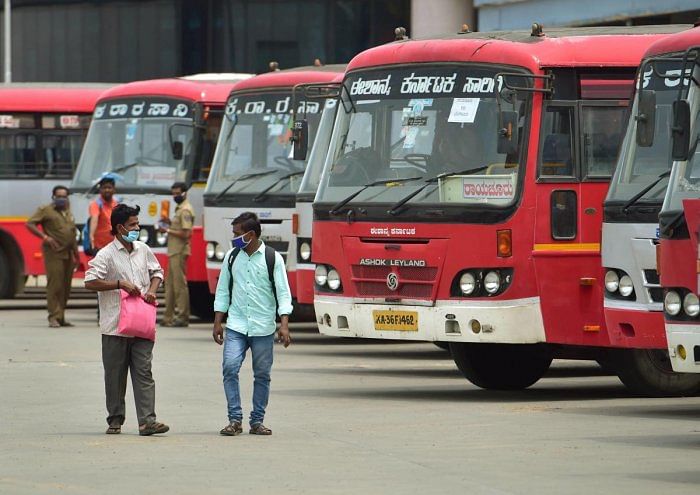
To revive the four road transport corporations that ply buses within Karnataka, Rs 10,000 crore would be needed, apart from several cost-cutting measures. This was stated in the report submitted by the committee appointed by the state government to assess the four RTCs—KSRTC, BMTC, NWKRTC and KKRTC.
The government had appointed retired IAS officer M R Sreenivasa Murthy to look for solutions to rescue KSRTC, BMTC, NWKRTC and KKRTC from the current financial crisis, and Murthy submitted its report to the chief minister on Tuesday.
According to the Murthy committee, Karnataka has the largest fleet with 24,000 state-owned buses carrying 1 crore passengers every day; of this, 20 lakh are students who depend on the RTCs for commuting to schools and colleges.
The committee flagged outstanding liabilities of the RTCs at Rs 4,426 crore. It also said that the RTCs have accumulated Rs 2,307 crore losses in 2019-20, which went up to Rs 4,689 crore in 2020-21.
Even before the Covid-19 pandemic, staff salary and fuel costs were pushing the RTCs into losses. While fuel cost increased from Rs 3,147 crore in 2013-14 to Rs 2,467 crore in 2019-20, the cost of staffing the RTCs increased by 47 per cent—from Rs 3,022 crore to Rs 5,072 crore—in the same time frame. “Staff costs accounted for 82 per cent of the increase in total costs,” the Murthy committee’s report stated.
Over the past few months, fuel costs have gone up further with the bulk price per litre of diesel reaching Rs 119.83/litre compared to the retail price of Rs 87.87.
Suggested solutions
One vital solution suggested by the committee was to convert to ‘driver-only’ operations with tickets to be sold by franchisees, or issued at bus stops and introduction of automatic fare collection technology. According to Murthy’s report, it will not only reduce the cost of issuing tickets from 15 per cent to less than 5 per cent of RTCs’ operational costs, it will also make up for the shortage of crew.
The report said workshop staff should be transferred to depots, and repair work could be outsourced if needed. Suggesting a “hiring restraint”, it said 17,000 vacant posts could be abolished.
As expected, the committee also was highly in favour of electric buses to reduce the fuel cost burden. “Operating cost per kilometre of e-bus is 50 per cent of that of diesel buses. Latest electric bus hiring rates are Rs 43.49/km, lower than BS 4 diesel bus operation cost,” it said, suggesting that “at least 50 per cent” of the future procurement by the RTCs should be e-buses.
The committee also suggested that the state government bring back the vehicle tax collected from RTCs, and reimburse the loss caused by bus-pass subsidies on a quarterly basis. It said the RTCs need to be supported by the government with consistent performance-linked funding.